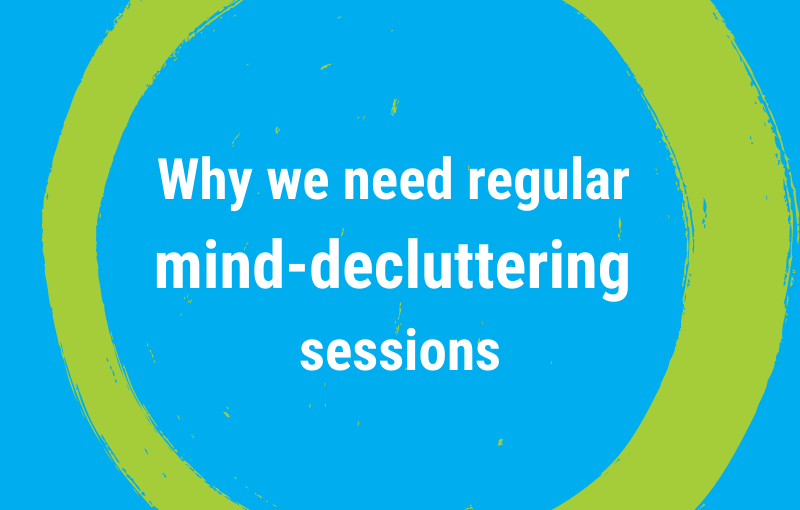Our thoughts determine how our life looks like.
When we think a thought about a certain circumstance in our life, that ‘sentence in our mind’ creates a feeling in our body. The feeling then drives an action. And the action creates a result.
If we don’t like the results that we are currently getting – e.g. living in a cluttered home –, then we can decide to change these results by changing our thoughts.
A thought is just a sentence in our mind, however – it has superpowers.
Usually, we don’t pay much attention to what’s happening in our mind.
We don’t consider deliberately what we are thinking and feeling and how that affects what we do (or don’t do) and achieve (or don’t achieve) in our life.
When we feel unhappy with our life, we often blame our current situation or other people and their behaviour – the circumstances in our lives – as the creators of our unhappiness.
But the circumstances in our lives don’t cause our negative feelings. Circumstances are facts. They are neither good or bad, they are neutral.
Our feelings of unhappiness and dissatisfaction are caused by how we think about the circumstances that we are experiencing.
The thoughts we think and the stories we tell ourselves determine how we show up in life. And how we show up in life determines the results we get.
How to declutter and organise our mind
If we want to make changes in our life, we first have to make changes in our mind.
-
- We have to become aware of the thoughts that we are thinking about ourselves and about the circumstances in our life.
- We then decide to clean up our mind and let go of the thoughts that don’t serve us. We declutter any (self-)limiting thoughts and replace them deliberately with new more helpful thoughts.
- Supported by the new thoughts about ourselves and the circumstances in our life, we now start to feel differently and act differently, more in accordance with who and how we want to be. – This is when we begin to create the results that help us to change our lives to the better.
All thoughts are optional.
This is good news because it means that we only have to keep those thoughts that we want to have.
The not so good news is that we are thinking more than 60,000 thoughts each day, and many of them are automatic and unconscious thoughts and not so easy to uncover. Thus, examining each thought when it comes up is actually impossible.
‘Thought downloads’ – a great tool to declutter our thoughts
The solution is to introduce regular mind-decluttering sessions in our daily life.
This works in a similar way as it does with regular home-decluttering routines.
We schedule a time for our mind-decluttering work, and then sit down and do a ‘thought download’:
1. We set a timer for 5 or 10 minutes and now take any upcoming thoughts out of our mind and put them on paper.
2. The next step is to pick up one thought and evaluate it. We can ask ourselves,
‘Does this thought serve me?
Does it help me to feel and act in a way that allows me to achieve the results that I desire?’
3. And then we decide if we really want to keep the thought or if it needs to be replaced.
A simple example of a thought download
Let’s say we feel stressed and overwhelmed because there is so much stuff in our home.
We decide to do a thought download about it.
We write down any thoughts that come up, such as: ‘I feel so bad about all the stuff. I don’t feel good at home. I don’t like my home anymore, I hate it! How can I relax with all the clutter around me. This is such a big job. It’s hopeless – how can I even get started.’
Now we pick one thought:
-
- We might choose this one: ‘I don’t like my home anymore, I hate it!’
We ask, ‘Does this thought serve me?’
The clear answer is ‘No, it doesn’t.’ If we tell ourselves that we don’t like our home, and if we feel hate, we will not be motivated to take action, we will not clear up, and there will be no change in the way our home looks like.
But we are free to decide to let the negative thought go and to replace it with a more positive one.
This could be, ‘My home is really important to me. I am determined to do whatever is needed to be done so that I can enjoy my home in future.’
-
- We could also pick this thought: ‘This is such a big job. It’s hopeless – how can I even get started.’
Does the thought serve us? No. As long as we think this thought, we will feel hopeless and confused, and unable to begin working on the problem. We procrastinate and nothing changes. We should get rid of this thought.
A more helpful thought could be, ‘Yes, it’s a big job. Thus, it’s a good idea to take the time and work on it step-by-step, dividing the work into small enough tasks that I can handle with confidence. I’ll get there.’
How can we organise our new thoughts?
Sometimes, it’s not difficult to replace a negative thought with a more helpful new thought.
We become aware of the limiting thought, make an immediate decision to think differently, and then manage to create a new thought pattern.
Often, however, it takes some time to create a permanent place for a new thought in our mind.
That’s normal because our mind got so used to its thought patterns.
If we don’t pay attention, it will automatically pick up the old thought again because we have thought it so many times. Our mind is so good at thinking that thought that it doesn’t want to give it up.
It can happen that we again and again have to sort out the old thought and put the new thought at its place.
However, finally, our mind will accept the new order of things and will ‘forget’ about the old thought.
The new thought has taken over and now reliably creates the feelings and actions that lead to the desired results.
TIP
Help your mind to get used to a new thought by deliberately focusing your attention on it for several days in a row.
-
- Write the new thought on post-its and place them all over your home, at places where you will see them frequently: the bathroom mirror, the bedroom door, the edge of your computer screen, etc.
- Send yourself an email with the new thought in the subject line.
- Send yourself daily reminders of the new thought via your online calendar.
- Use the teeth-brushing-time to think about your new thought.
- Tell a friend about your new thought.
- … (What else could you do to remind yourself of your new thought?)
HOW CAN I HELP YOU?
Are you tired?
Tired of trying to (re)organise the various areas of your life entirely on your own?
Fortunately, you don’t have to figure it out all by yourself.
We can do it together.
You can decide to get my support, advice, and guidance – and achieve the desired changes in your life so much faster and easier.

